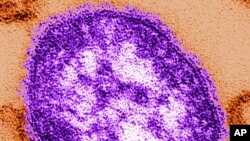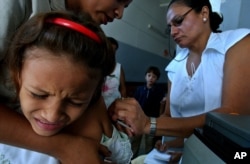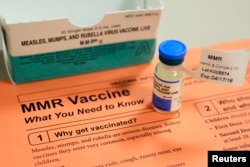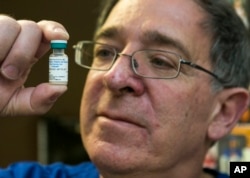The Pan American Health Organization says endemic measles has been eliminated from the Americas — all the countries in North, South and Central America. The achievement comes after years of intense efforts to vaccinate children under the age of five.
Countries in Latin America reported their last endemic cases of measles in 2002. A country is considered disease-free if there have been no new cases for three years, and the report had to be certified by the International Committee of Experts for Documentation and Verification of Measles, Rubella and Congenital Rubella Syndrome Elimination in the Americas.
The Committee received evidence from all countries in the region between last year and this past August. The committee also found the Americas has been declared free of another childhood illness, rubella and congenital rubella syndrome, since 2015.
Carissa Etienne, the director of PAHO, called the certification that no more home-grown measles cases exist in the Americas an “extraordinary milestone,” saying endemic measles elimination can be achieved when countries work together at the local, state and federal levels.
Internationally, the effort was assisted by the U.S. Centers for Disease Control and Prevention, the American Red Cross, and the March of Dimes.
Vaccination still needed
The goal now, said officials, is to maintain the gains through the widespread vaccination of youngsters beginning at the age of one, and making sure they get a booster shot at 18 months.
But officials warned that cases of the highly-infectious childhood illness could still be brought into the region by people traveling from other countries where the disease continues to circulate.
According to Susan Reef of the CDC, which provided financial and technical support to the vaccination campaign in Latin America, the reintroduction of measles into the Americas is just “a plane ride away.” Last year, a mini-measles epidemic occurred in California when people from overseas visiting Disneyland came in contact with unvaccinated children. To stop that from happening again, Reef stressed that continued surveillance and immunization is critically important.
According to PAHO officials, two billion children worldwide have been vaccinated against measles since intensive efforts to eliminate the disease began 22 years ago. Officials say there has been a nearly 80 percent reduction in the number of cases globally.
Inexpensive and readily available vaccines have saved the lives of 17.5 million children in 149 countries since the World Health Organization and other groups began an active campaign. While most children survive their infections, measles can be fatal. Worldwide, public health officials say 315 children continue to die of measles each day.
Worldwide elimination the goal
While 100 percent of vaccine coverage is ideal, officials said elimination of measles could be maintained if vaccination remains above 95 percent.
PAHO officials noted recent outbreaks of measles in the U.S. state of California because some parents have refused to vaccinate their children out of fear that the vaccines are harmful or that if enough children are immunized, their kids won’t become infected.
Officials say the global anti-measles effort will have to continue to provide information on the benefits of vaccination, as well as scientific information on its safety to those who refuse to vaccinate.
Elimination of measles in the region of the Americas is an example of how a disease can be eradicated through vaccination. Today, officials said, the childhood illness is the fifth vaccine-preventable disease to be eliminated in Latin American.
Public health officials say the goal is to eliminate measles worldwide, joining the global eradication of smallpox and the near elimination of polio, something that PAHO head Etienne says can be achieved when countries work together.



